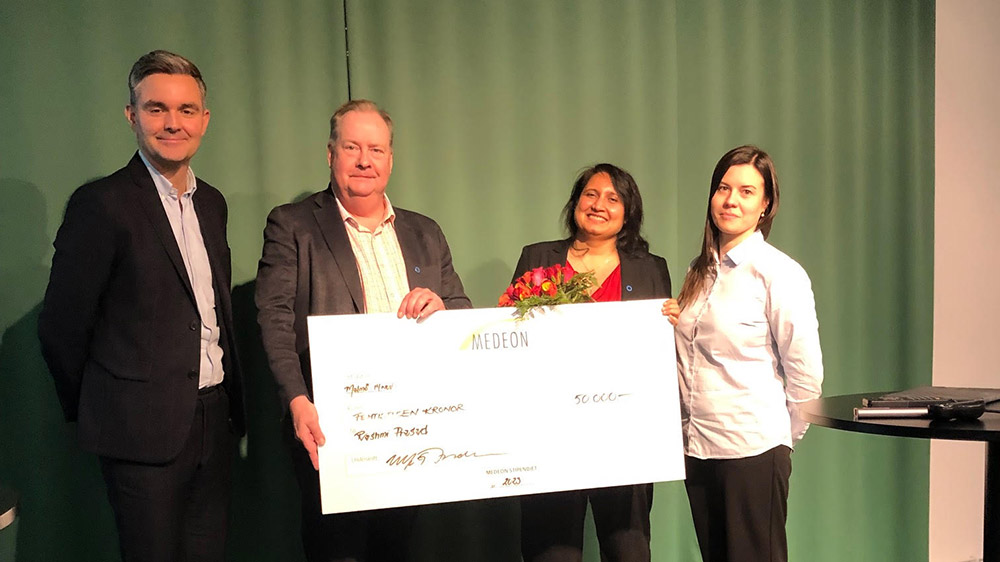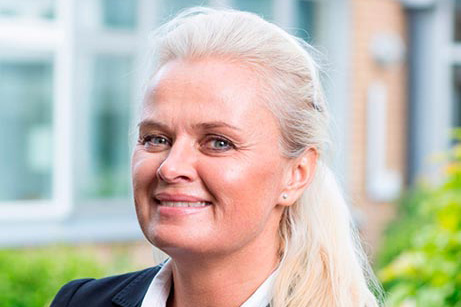Medeon Blogg

Awarded Research on Inherited Risk of Developing Diabetes
This year's receiver of the Medeon Scholarship of 50 000:- sek is diabetes researcher Rashmi Prasad, associate professor in genomics, diabetes, and endocrinology at Lund University. She is awarded the scholarship for her research on genetic inheritance and findings that demonstrate why the mother has a great impact on a child's risk of developing type 2 diabetes later in life.
"It is surprising how your early life can influence your risk of developing type 2 diabetes, and how the life conditions and genetics of mothers, fathers, and even grandparents can affect this risk. How early can we prevent this? There is still much missing knowledge about the disease. If we can understand more, we are more likely to be able to prevent the disease. I want to be part of explaining the mechanisms that influence the risk of developing the disease," Rashmi Prasad says.
World-leading research attracted her to Lund
With a master's degree in microbiology, including genetics, from India, followed by PhD studies in Germany, Rashmi Prasad joined Professor Leif Groop's research group at Lund University in 2012.
"Leif Groop is one of the pioneers in this research field and published one of the first papers on diabetes genetics in 2007. It's a very challenging field that includes heritability, genetics, and the environment. I was very interested in his research, and in 2012 I had the opportunity for a post-doc in his research group.," she says, continuing:
"My close family is diabetic, so this research is very personal for me. Who you are is a product of genetics and the environment.”
The impact of the mother’s nutritional status
Rashmi Prasad has also shown, in a Tanzanian study, that the mother´s nutritional status during pregnancy has a significant impact on the child’s overall risks and specifically on the risk of developing diabetes. If mothers had very low nutrition and anemia during early pregnancy, this can affect how the fetus develops. One cause is that the fetus has lower levels of insulin, and the expression of many genes is impacted.
Recently published findings from studies on Indian mothers and their children reveal the reasons why Indians develop type 2 diabetes earlier in life and at a lower BMI compared to Europeans.
"Leif’s team, which I was part of, discovered that there are four subtypes of type 2 diabetes, and that there are genetic differences between the subtypes. I applied this research to Indian participants and found that insulin deficiency is a driver of diabetes here and not insulin resistance as was thought before. My findings were that individuals in India with type 2 diabetes had poorer beta-cell function, leading to insulin deficiency. The genetics in India and Sweden have some similarities and some differences which helps us understand how these subtypes develop in different countries. The key issue is insulin secretion," Rashmi Prasad says. She continues:
“India is a country with a lot of malnutrition in the population. So, this, and especially malnutrition in the mothers, could increase the risk of type 2 diabetes in the children when they grow up and are older by affecting their beta cell development and function.”
Rashmi Prasad radiates passion for her research field.
"I was super surprised to be awarded the Medeon Scholarship, and it is a huge honor to be recognized for my work. Hopefully, I can convey my enthusiasm. I am excited to, hopefully, in my research find measures for preventing the illness and also contribute findings that can lead to new drugs."
